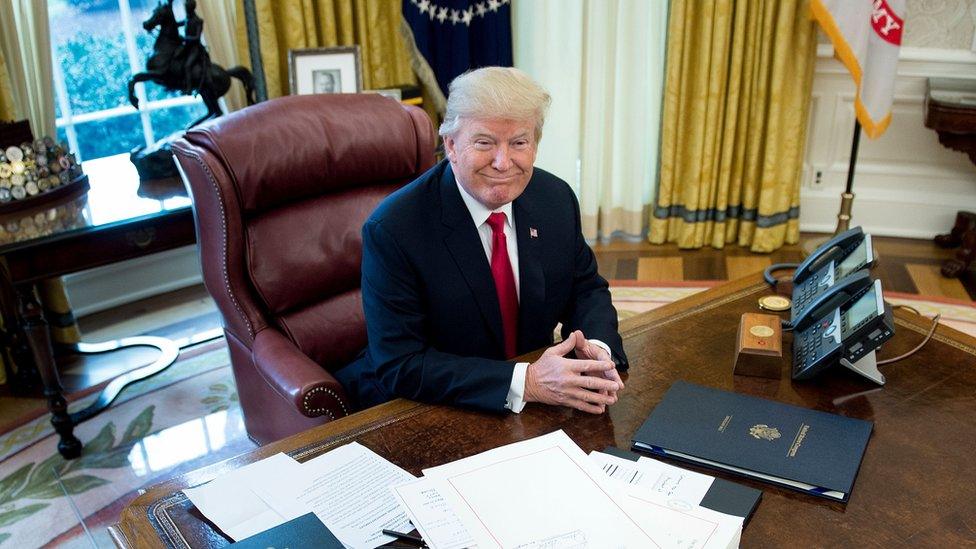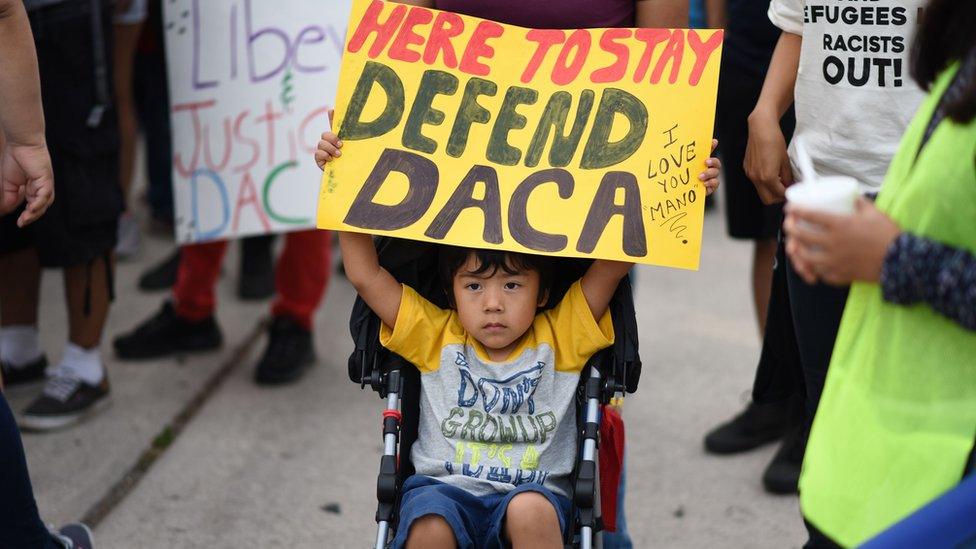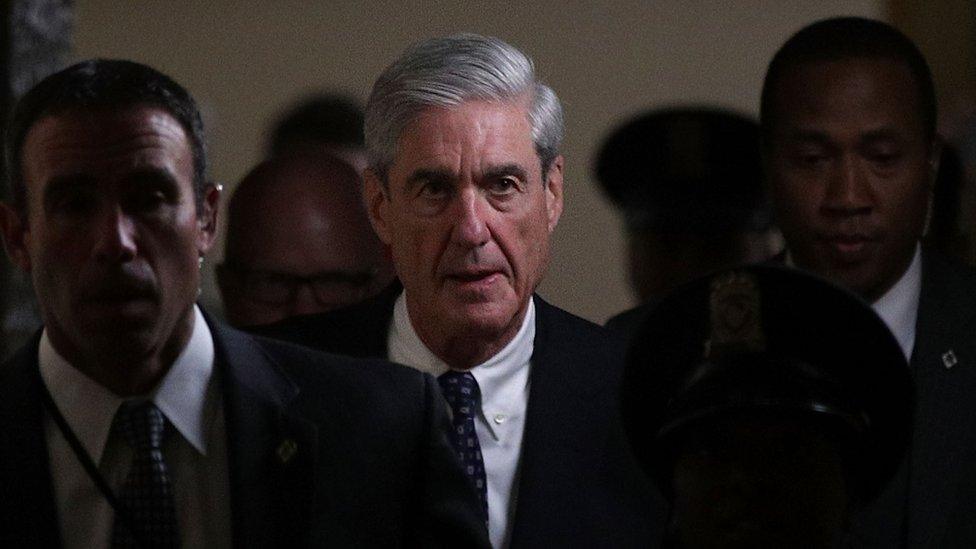Donald Trump faces tough January tests
- Published

Donald Trump spent 11 days golfing and tweeting from his oceanside resort, basking in the warmth of the southern Florida sun and the glow of successful passage of a tax-reform bill, the first major piece of legislation of his nearly year-old presidential term.
Now Mr Trump has returned to Washington, where he faces the cold reality of a January filled with deadlines, hard decisions and an ever-lingering potential for missteps and bad news - a winter of peril for a presidency balanced on a knife's edge.
With November mid-term elections looming, here are just a few of the major tasks that sit in the White House in-box as the new year gets under way.
Budget blues
From the people who brought you the impending budget showdown of 30 September, 8 December and 22 December, comes the exciting fourth instalment of this epic saga. Once again, legislators are faced with funding the federal government for the current fiscal year or risking a government shutdown. Every previous cliffhanger had ended with a decision to temporarily approve spending at the previous year's levels. The most recent extension ends on 19 January.
Would Donald Trump win an election today?
If they decide to continue along that path, it wouldn't be the first time in recent memory - but at some point legislators will want to put their mark on the federal government by rejigging how dollars are allocated. Mr Trump's much-touted border wall, increased defence spending, cuts to government programmes (once a headline-grabbing affair but now largely forgotten) and infrastructure investment are all up for grabs.
In addition, Congress has to vote to raise previously mandated budget caps or an axe will fall on military and domestic spending alike.
Bottom line: Congress has been kicking the can down the road like a legislative Lionel Messi. Will they finally take their shot?
Immigration issues
On 5 September Mr Trump started a countdown - what he termed an "orderly wind down" - to the termination of a programme that provided temporary normalised immigration status for hundreds of thousands of undocumented immigrants who were brought to the US as children.
Some previously covered individuals began losing protections from the Obama-era measure, called Deferred Action for Childhood Arrivals (Daca), in December, with the number growing at a rate of more than 100 a day. It is unclear, however, if the Trump administration will make any special effort to target them for deportation.

Pro-Daca activists are calling on Democrats to push harder for renewed protection
What is clear, however, is that the political pressure for some form of legislative Daca authorisation is increasing. In a tweet on 2 January, the president tried to assign blame for the impasse on his opponents, saying that Democrats are "doing nothing" and "just interested in politics", which he says will lead to increased Hispanic support for his party.
Although it seems unlikely that Republicans will benefit from a crisis Mr Trump himself instigated, Democratic politicians have been targeted by pro-Daca protesters, who feel the party has been insufficiently aggressive in attempting to force a deal.
The president has said he wants immigration reform and border-wall funding to be part of any Daca agreement, while Democrats have insisted on much narrower legislation. Someone will have to budge.
Bottom line: Unless a deal is brokered soon, more and more Daca recipients will be forced back into the legal shadows, where they can't pursue proper jobs, financial security or educational opportunities. There could be political winners and losers in such a situation, but there is likely to be plenty of blame to go around.
Healthcare headaches
The Children's Health Insurance Program (Chip), which provides government-funded health insurance for 9 million US children from low-income families above the poverty line, has had broad bipartisan support since it was first enacted in 1997. In the past few months, however, it has been the centre of a political tug-of-war, as funding was set to expire without reauthorisation.
Five things we learned from Donald Trump's Christmas holiday
In late December, Congress allocated enough money to keep Chip afloat until March, but the states that manage the services want a permanent fix so they don't have to continue to make preparations for a budgetary crunch. Democrats are pushing for a straight-up reauthorisation, while Republicans seek to tie the bill to cuts in other government healthcare programmes.
The arguments over Chip are nothing compared to the Obamacare repeal conflagrations, which show no signs of ending in 2018. In the recently passed tax reform bill, Republicans dealt a blow to the system by setting a January 2019 end to the mandate that all Americans have insurance or face a tax penalty.
The provision was an Obamacare lynchpin, as it increased the number of healthy Americans in the insurance pool and prevented individuals from waiting to buy health insurance until they got sick.
Democrats and some Republican moderates have been clamouring for a number of legislative provisions that will bring increased stability to the health-insurance marketplaces in 2018. Hard-line conservatives, on the other hand, seem content to chip away at the foundations until the whole thing collapses.
Bottom line: Expect more healthcare fights in 2018, with poor children caught in the middle.
Iranian intrigue
Back in mid-October, Mr Trump - to great fanfare, including a high-profile White House statement - officially decertified Iran's compliance with the terms of the nuclear deal that Barack Obama and representatives of five other major world powers brokered in 2015.
That set off a 60-day period during which Congress could, by majority vote, choose to re-impose sanctions on Iran. Congress chose to do … nothing.
On 11 January, as mandated by the agreement, Mr Trump must once again decide whether to certify Iran's compliance. If the president again declines, the bite of such a move given recent congressional inaction will be greatly diminished.
Iran protests: Why people are taking to the streets
The president could choose to bypass Congress and re-impose sanctions on his own. Mid-January will mark the next once-every-three-month opportunity for him to end the current waivers suspending previous economic punishments.
Given Mr Trump's sharp rhetoric in support of the recent Iranian protests, he may decide more dramatic action is warranted. Too heavy a US hand, however, could prompt the Iranian public to rally behind their government.
Bottom line: In October the president said if Congress failed to "reach a solution" on Iran, he'd terminate the deal. Congressional inaction - and Iranian unrest - puts the president on the spot again.
Trying times
As if all this weren't enough, Section 702 of the Foreign Intelligence Surveillance Act, which grants the US government sweeping powers to monitor communications without individualised court-issued warrants, is set to expire on 19 January. Congress passed a temporary extension of the measure in December, but civil libertarians on the left and right will make an effort to derail a lengthy reauthorisation.
In December the House of Representatives approved an $81bn disaster relief bill, including funds for hurricane-ravaged Puerto Rico, but the Senate has yet to take action. Nearly half of Puerto Rican customers are still without power after Hurricane Maria hit the island in mid-September.

Robert Mueller is out of the headlines - for now
Beyond these immediate concerns, the president and his fellow Republicans will have to settle on a legislative course for the coming months. They could try for a stand-alone infrastructure spending bill, which was one of Mr Trump's top campaign promises. The president could push for new trade legislation, such as a revised North America Free Trade Agreement (if such a thing ever emerges from negotiations with Mexico and Canada). Speaker of the House Paul Ryan has shown interest in making another run at reforming US social safety-net programmes.
And, oh yeah, there's still that little matter of Robert Mueller's investigation into possible Trump campaign ties to Russia to account for. A metaphorical bombshell here - or real bombshells on the Korean Peninsula - could throw everything else into total disarray.
US President Donald Trump: The political survivor?
The stakes are high, as the next few months will be the last chance for Republicans to make their mark before the US political world focuses squarely on the November mid-term elections. Every seat in the House of Representatives, a third of the US Senate and a gaggle of key state governorships will be up for grabs this year.
Trump believes he will be treated 'fairly'
Can Republicans maintain their unified control of the US government for another two years, or will Democrats regain control of at least one chamber of Congress, slamming the door on Mr Trump's more ambitious legislative goals? If the recent elections in Virginia, New Jersey and Alabama are any indication, it could be a rough ride for the incumbent party.
Bottom line: The holidays are over. January is going to have all the excitement of the first year of the Trump presidency, condensed into one action-packed month.